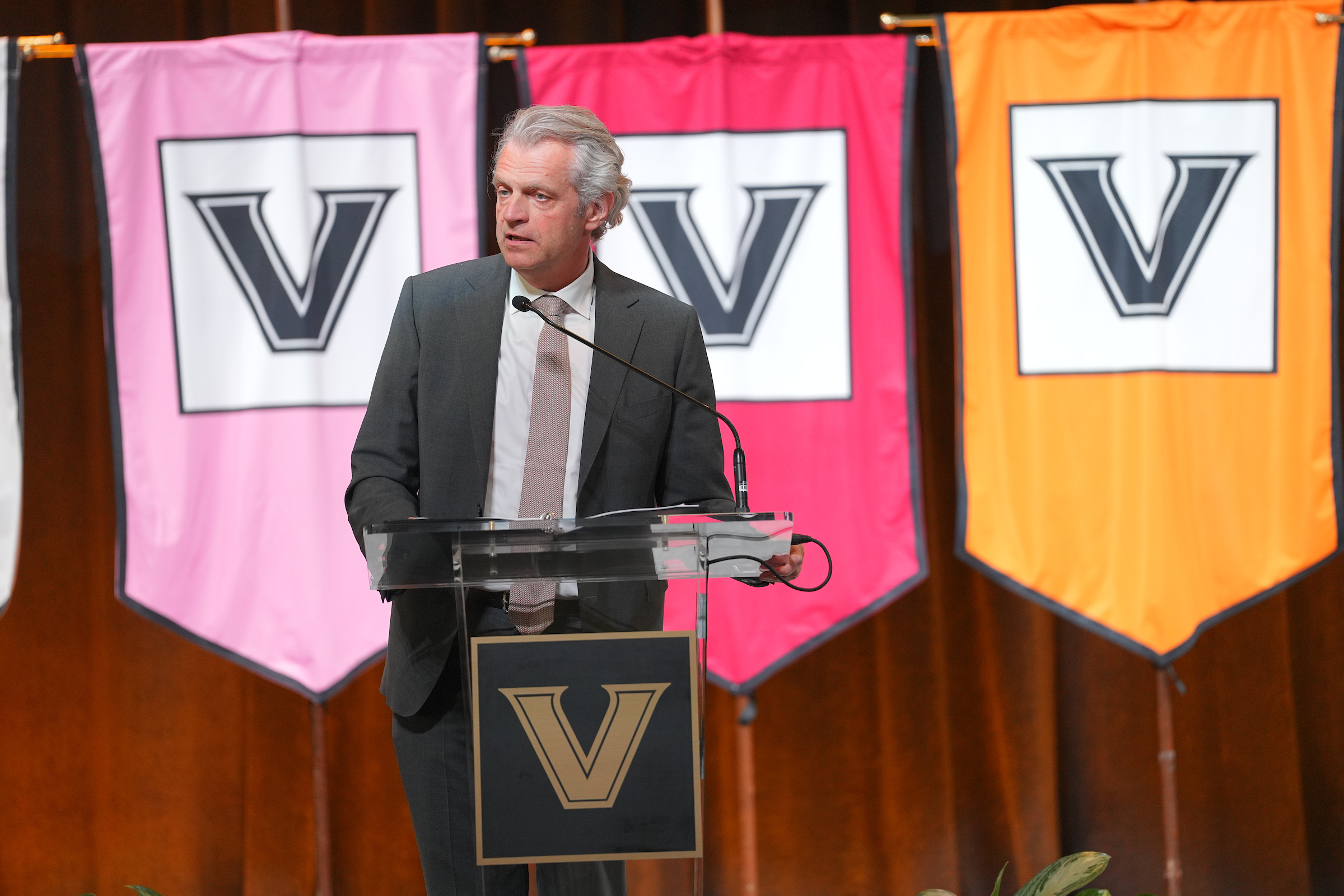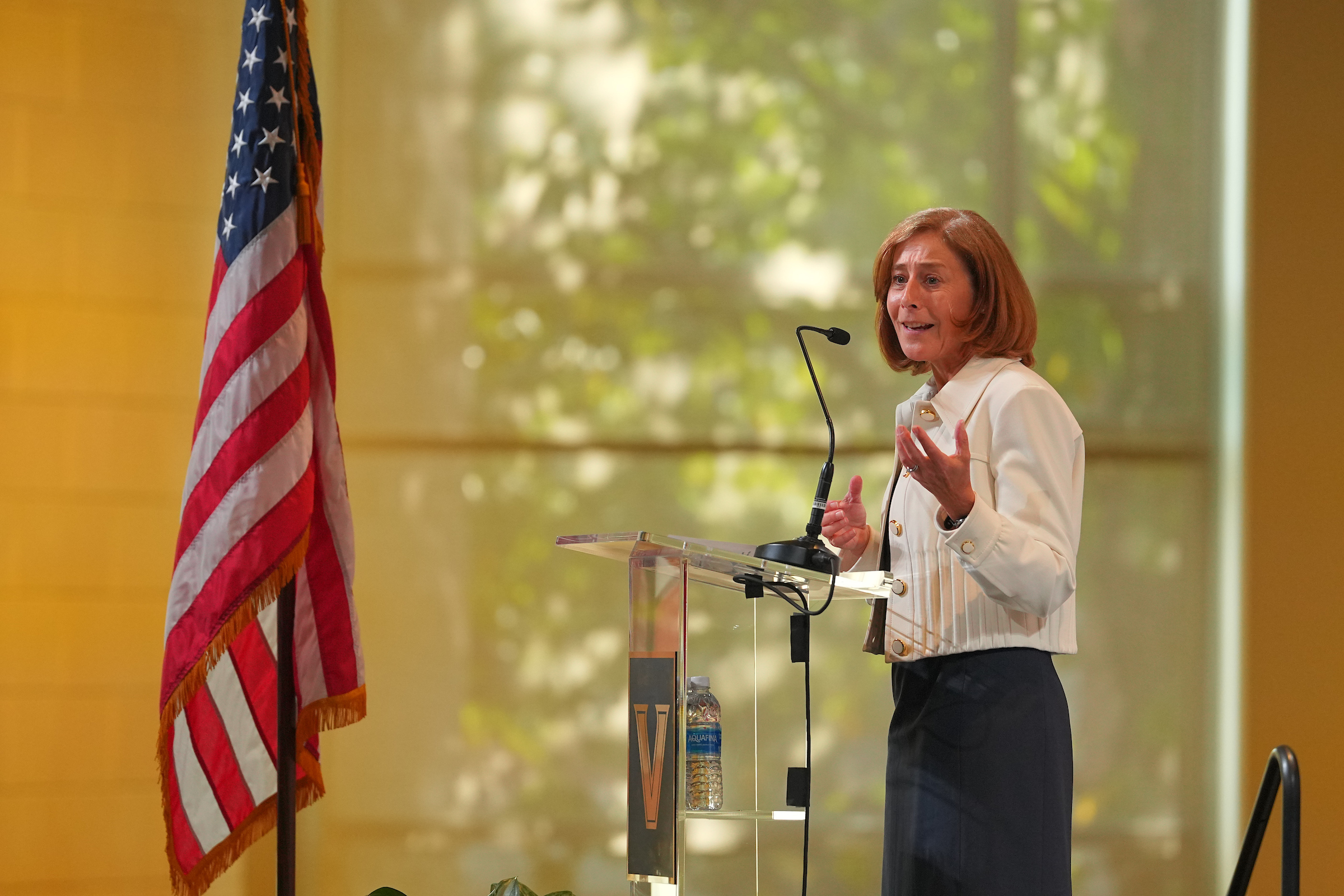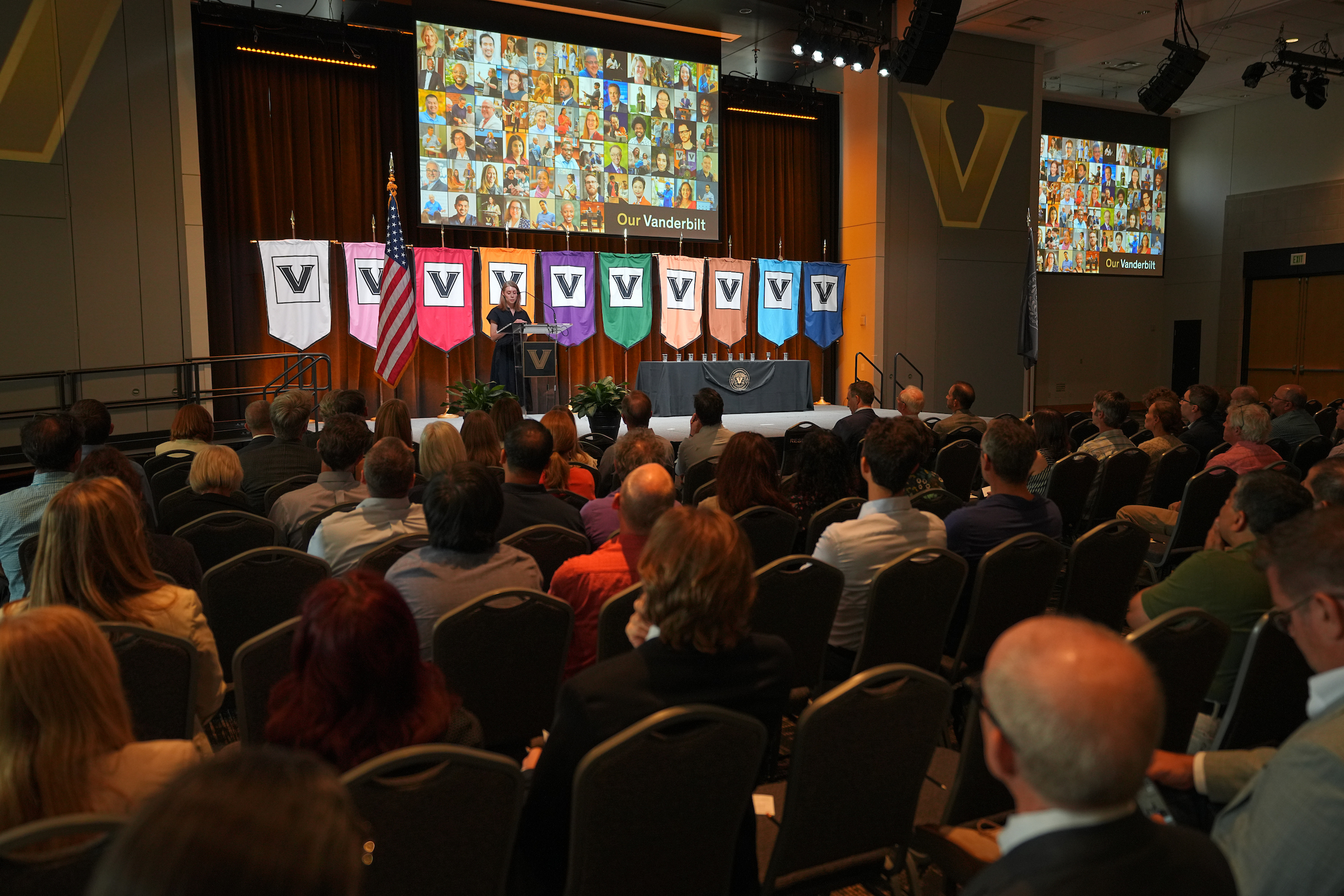Higher education is facing an unprecedented crisis of faith, Chancellor Daniel Diermeier told faculty gathered for the annual Fall Faculty Assembly on Aug. 22. Although low public opinion and sharp criticism have recently plagued universities, Vanderbilt has been an exception to the prevailing narrative, he said.

At this year’s assembly, which included the presentation of some of the university’s most prestigious awards, Diermeier outlined five major efforts that build upon the university’s accomplishments, including the expertise, impact and achievements of the faculty:
In a society shaped by technology, Vanderbilt is providing more students with the skills and credentials they need through the establishment of the College of Connected Computing.
The new College of Connected Computing’s teaching and research in AI, data science and other disciplines will advance those fields and support students and faculty throughout all the university’s schools and colleges. “No matter what one studies or investigates at Vanderbilt,” Diermeier said, “they will have the fluency in technological tools, and the access to them, to excel.”
The university is co-leading efforts to develop the region’s innovation economy—the segment of the economy driven by invention and entrepreneurship.
Diermeier, who appointed an innovation ecosystem advisory group made up of faculty and staff from across the university in June, shared the progress made toward establishing the Nashville Innovation Alliance with Mayor Freddie O’Connell. The alliance brings together players from across the public and private sectors to cultivate a more robust innovation ecosystem in Nashville.
“We are working to bring you the partners, capital and infrastructure you need to translate your scholarship and research into commercial solutions that have real impact,” Diermeier said.
In July the alliance hosted a forum in which visiting experts shared insights from their experiences developing innovation districts in their cities. One of the key takeaways was that Vanderbilt is uniquely situated to pursue development of an innovation space in partnership with local government.
“We are in the very early stages of planning for a space for innovation on or adjacent to campus,” Diermeier said.
The university is moving ahead with efforts to launch the Institute of National Security.
Under the leadership of its founding director, retired U.S. Army Gen. Paul Nakasone, and Executive Director Doug Adams, the institute will work to solve pressing national security challenges, ranging from ransomware to geostrategy to fentanyl poisoning. These challenges are growing, but the pipeline of national security talent is shrinking, Diermeier noted. Vanderbilt’s multidisciplinary approach is essential to helping meet these challenges.
Vanderbilt is forging partnerships with universities around the globe to “bring more of the world to Vanderbilt, and more of Vanderbilt to the world.”
The university recently welcomed a delegation from Leipzig University, an institution with deep historical ties to Vanderbilt. During the visit, Vanderbilt announced the renewal of its longstanding partnership with Leipzig. “Such relationships offer new possibilities for collaboration and research to you, and new immersive learning opportunities to your students,” Diermeier said to the faculty audience. “We are finalizing partnerships with several more institutions, and we hope to announce them in coming weeks.”
The university is exploring opportunities to expand its presence in the U.S.
Following on an effort that began with regional Vanderbilt hubs in New York, Atlanta, Houston and Florida, the university is currently in discussions with city and county officials in South Florida about expanding business and computing programs on a new campus in West Palm Beach, which will enhance opportunities for faculty and students. “We have shared our vision with the community there, and the community has embraced it,” Diermeier said. “Much work remains, but here, too, we expect to have more news to share later this semester.”
Provost encourages faculty to pursue bold aims, take risks

Provost and Vice Chancellor for Academic Affairs C. Cybele Raver set an inspirational tone during her remarks at the faculty assembly, sharing personal stories that embodied three essential lessons she hoped faculty would embrace throughout the academic year.
Pursue bold aims with strategic action.
Raver encouraged faculty to think about ways to be bold and to cut a new path in their teaching and research. She emphasized the importance of seizing opportunities, even when they come with uncertainty.
“About 18 months ago, the chancellor encouraged me to lead one of Vanderbilt’s most ambitious projects—the launch of the College of Connected Computing. This wasn’t just about adding new program,” Raver said. “It was about reimagining how we approach technology, data science and interdisciplinary collaboration.”
“Launching a new college is a bold and risky endeavor,” she said, “especially since this is Vanderbilt’s first new college in over 40 years. But the best advice I’ve ever received is to ‘step through the door when it opens.’”
When you take risks, you’re not just operating with the probabilities of your own cup.
Through a memorable recounting of one of her favorite games, Liar’s Dice, Raver described how it encourages wild risk-taking. In the game, players receive a cup and five dice each. They then roll their dice and guess how many of a certain number are under their cup and the other player’s cup. As the guesses become more seemingly improbable—seven dice showing four, for example—players find out that, in reality, they’re very much possible.
“When you take risks, you’re not just operating with the probabilities of your own cup—it’s about what’s in everyone else’s hand too,” Raver said. “It’s the collective capacity and capability that we all have here together. It’s truly tremendous and inspiring to take a risk, place a bet, and be bold and ambitious when you estimate the probability of success.”
“Let’s say you place a big bet with your work, with your aims, with your plans for collaborating with others to pursue a really big idea,” she said. “What are the probabilities you need to complete even the skeletal version of that idea? Because we’d all probably be excited and impressed even if you make it most of the way, even if you don’t hit the target 1,000 percent.”
We can achieve great things because of our power of collaboration.
Raver lauded Vanderbilt faculty for their deep respect for each other’s work, and how they regularly turn to each other to collaborate. “We achieve great things because of a phenomenal level of collaboration,” Raver said. “And that collaboration leads us to be bolder. Remember that cup, with all those dice that I have. Remember that cup, with all those dice that you have. That example reminds us of all the talent we have when we stretch across boundaries.”
Amendment to Faculty Senate constitution passes
Alissa Hare, assistant dean of the College of Arts and Science and Faculty Senate chair, convened the meeting with an overview of the senate’s role before requesting a vote to amend the Faculty Senate constitution. The resolution, which passed with an overwhelming majority, allows all members of the executive committee—including the immediate past chair and the immediate past vice chair—to attend Faculty Senate special sessions as nonvoting ex officio members for one year after their term ends.
